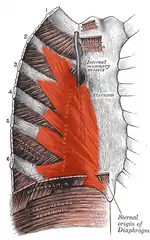Musculus transversus thoracis
Der Musculus transversus thoracis (lat. für „querer Brustmuskel“) ist ein beim Menschen inkonstanter, quergestreifter Muskel, welcher die Wand des Brustkorbs verspannt und bei der Ausatmung mithilft.
| Musculus transversus thoracis |
|---|
 |
| Ursprung |
| Processus xiphoideus sterni, Corpus sterni Cartilago costalis der (6. bis) 7. Rippe |
| Ansatz |
| Cartilago costalis der Costae 2 bis 6 |
| Funktion |
| Hilfsmuskel bei der Exspiration Spannt die Thoraxwand auf |
| Innervation |
| Rami anteriores Nervi thoracici (Nervi intercostales) |
Seinen Ursprung hat der Muskel am Schwertfortsatz (Processus xiphoideus) des Brustbeins (Sternum) und am knorpeligen Teil (Cartilago costalis) der (6. bis) 7. Rippe. Der Ansatz des Muskels liegt am Rippenknorpel der 2. bis 6. Rippe.
Der M. transversus thoracis wird durch die vorderen Äste der Spinalnerven des Brustabschnitts des Rückenmarks innerviert. Die Arteria und Vena thoracica interna durchbohren den M. transversus thoracis und verlaufen dann an dessen Außenseite.
Literatur
- Werner Penzner (Hrsg.): dtv-Atlas der Anatomie. 4. Auflage. Band 1. dtv, München 1984, ISBN 3-423-03017-8, S. 82.
This article is issued from Wikipedia. The text is licensed under Creative Commons - Attribution - Sharealike. The authors of the article are listed here. Additional terms may apply for the media files, click on images to show image meta data.